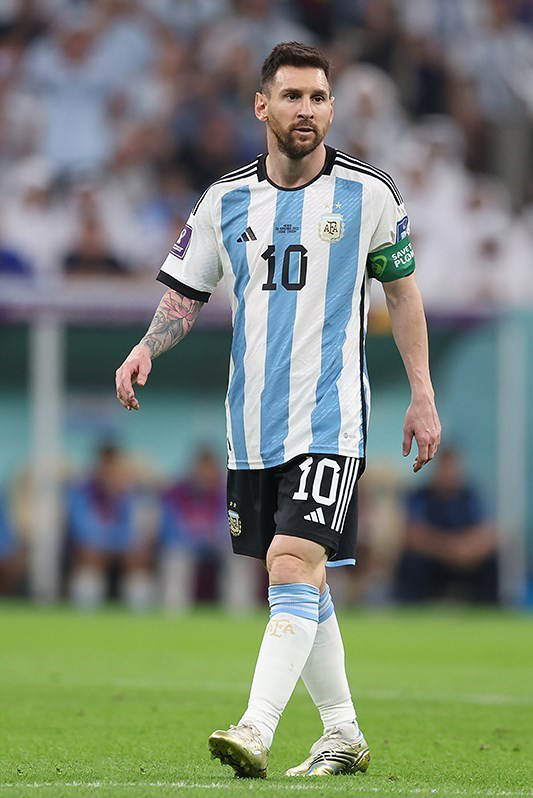Argentina has rarely fielded a legitimate team to compete against elite opponents in the World Cup. Their recent teams have been only a collection of individuals who look to Lionel Messi for magic – like how a lost puppy might chase after its owner. Messi is undisputedly one of history’s greatest football players. Who wouldn’t rely on him?
The days of a Maradona-esque player carrying Argentina to victory are long gone. Tactics have evolved to decrease open space in the midfield. It is virtually impossible to reach the latter stages of the World Cup without a disciplined midfield. Argentina’s Messi-led teams have been knocked out four times by better organized German and French squads. Each match, they were able to contain Messi’s influence by having multiple players commit to hinder his ability to cut inward from the right. Messi couldn’t create chances, forcing his teammates to scramble to find scoring opportunities. Twice his opponents have gone on to win the tournament. A cohesive team is always stronger than a one man show.
Argentina has long been guilty of assuming that Messi’s brilliance alone can push them to win a third World Cup.
The Argentinian national team does have quality players. Many of their starters have won individual accolades and championships for their club teams across the globe. Yet, they lack players that can consistently maintain a high level for both their club and country. Sergio Aguero, Angel Di Maria, and Paolo Dybala are all talents who have dominated their respective club leagues but failed to perform similarly for Argentina. This is an understandable problem to have. A player like Messi inevitably means others must sacrifice their preferred playing styles and habits to suit him. However, this often has the adverse effect of turning his teammates into spectators rather than contributors. His teammates continuously missed the chances he created during their loss in the 2014 World Cup Final against Germany. During the 2018 World Cup, they created fewer chances and conceded nine goals in four games. A team can only rely on one player to perform for so long. Doing so results in repetitive formations that become predictable to the intelligent opponents who Argentina will face in the later stages of the World Cup.
Other national teams with superstars have faced similar problems. Portugal relied heavily on Cristiano Ronaldo to reach the final of the 2016 European Cup against France. France fielded a highly organized team with multiple players assigned to prevent Ronaldo from maneuvering into the centre while attacking. Portugal’s offense was in disarray since most chances were created by Ronaldo. This changed after the 25th minute when Ronaldo was substituted off due to injury. Suddenly, France no longer had to contain one player to restrain Portugal’s entire offense. French midfielders drifted forward and left large pockets of space vulnerable for Portugal to exploit. This eventually resulted in Portugal scoring the only goal of the game and winning the final 1-0. Portugal could no longer rely on Ronaldo’s talent and their counter attacks became less predictable and more dynamic.
The example of Portugal in 2016 is not meant to argue that national teams are better off without their superstars. Portugal would never have reached the finals without Ronaldo. Rather, it demonstrates that overt reliance on a single player is not a formula for victory against the world’s best.
Argentina has long been guilty of assuming that Messi’s brilliance alone can push them to win a third World Cup. But there might be a change in 2022. Messi’s transfer to PSG last year likely changed the circumstances which resulted in Argentina’s Messi dependence. His PSG teammates Kylian Mbappe and Neymar Jr. have the speed and stamina that is naturally declining in the 35 year old Argentinian. While he has not scored as much as he did with Barcelona, he has been a prolific passer and currently holds the most assists in the entire French League. His time at PSG can be characterized by a shift in playing style that puts him more as a playmaker than a goal scorer.
The days of a Maradona-esque player carrying Argentina to victory are long gone.
Messi’s experience at PSG has the potential to make or break Argentina’s World Cup. Argentina’s success in Qatar depends on whether younger players who’d previously played supporting roles are able to capitalize on Messi’s heightened experience as a playmaker. This would allow Argentina to create chances without depending solely on one player’s capabilities. The talent that Argentine players have shown in their clubs is undeniable. Yet, if Argentina continues to rely overtly on the aging Messi, the World Cup will have a familiar outcome this year.


